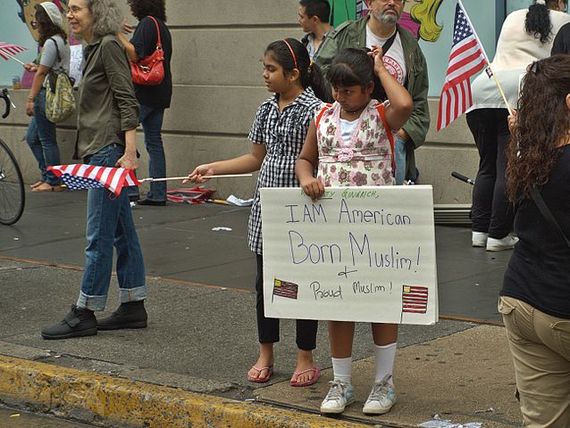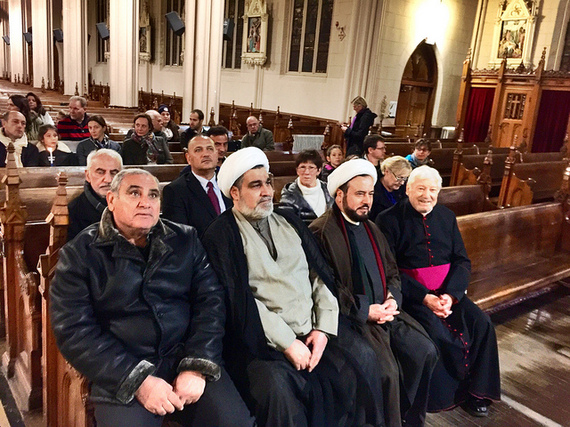What is frightening about the recent mass killings in San Bernardino, Calif., is how easily seemingly ordinary individuals can wreak havoc on the lives of so many innocent people.
Our vulnerability to mass murder has been revealed many times in recent years. In shooting up a movie theater in Colorado or slaughtering children at an elementary school in Connecticut, young American men terrorized a nation.
This year alone, a young man reportedly saying he wanted to start a race war opened fire in a black church in South Carolina. And again last month, a young man with a hatred of religion asked individuals if they were Christians before shooting them in the head at a community college campus in Oregon.
But the ramping up of public fears, and the demands for action assigning collective responsibility to millions of Americans for the actions of individuals, soared with the murders this month of 14 people by a couple with ties to terrorist groups claiming to act in the name of Islam.
The percentage of Americans identifying terrorism as the most important issue facing the nation jumped nearly five times in the last month. No other issue was cited more often, according to a New York Times/CBS News poll.
The good news is that research is revealing ways that governments and people throughout the nation can reduce the threat of terrorism, and dramatically compromise the ability of terrorist groups such as ISIS to recruit Americans.
None of them involve barring all Muslims from entering the country, as proposed by Donald Trump, the volatile presidential candidate.
Several national and international studies show such policies do not work.
"We find just the reverse happens," said sociologist Roger Finke of Pennsylvania State University, a leading researcher on religious freedom.
Restricting the freedoms of one religious group creates higher levels of tensions, increases the risk of violence and persecution and is associated with greater loss of freedom for majority and minority faiths alike, he said.
"It's a bad response because it's the wrong response."
So what can we do to make ourselves safer?
Here are four ways research indicates may help reduce the threat of terrorism and preserve civil liberties:
Protect religious freedom: The more religious rights are restricted, the greater the potential for religious persecution and violence, according to a study by researchers Brian Grim and Finke analyzing religious freedom in 143 nations with populations of more than 2 million.
Looked at another way, greater religious freedom serves to reduce conflict, in part by decreasing public tolerance for vigilantism against less popular groups and guarding against the "tyranny of the majority," they reported in their book "The Price of Freedom Denied." Minority religious groups also have fewer grievances that potentially fuel violence.
One other incentive: Religious restrictions aimed at one group tends to end up curbing civil liberties for all.
For example, there have been well-publicized cases of communities trying to use zoning laws as a way to keep out mosques.
But the great majority of such battles over houses of worship involve Christian congregations confronted by local governments bowing to pressures from Not In My Backyard groups of neighborhood residents or seeking to keep limited open land on the tax rolls.
"It comes down to one basic saying, 'Your freedoms are my freedoms,'" Finke said.
Maintain an independent judiciary: In a separate study on the origins of religious restrictions, the sole positive predictor of fewer religious restrictions was an independent court system.
As we have seen in the past few weeks, politicians seeking to exploit public fears and biases can propose policies such as imposing a religious test on immigration or requiring members of one faith to publicly identify themselves.
But it is the courts that can uphold constitutional rights protecting freedom of belief.
"Religious freedoms depend on an independent judiciary for protection, rather than on a voting majority or the effectiveness of the government," researchers Finke and Robert Martin noted in their study.
Western courts already appear to be falling short of equal applications of the law, research suggests.
Muslim claimants in religious liberty cases in U.S. federal courts were only about half as likely to receive accommodation of their religious beliefs and practices as were claimants from other religious communities, one study found.
"The persistent uneasiness of many Americans about Islam and its followers appears to have filtered into the attitudes of such well-educated and independent elites as federal judges," researchers said.
Respect your neighbor: What is the strongest predictor of religiously motivated violence? Public displays of bigotry that can take forms ranging from intemperate remarks at the grocery store to a sea of faces at political rallies in France where secular liberals demand restrictions on Muslim practices to preserve "our way of life" to a GOP campaign stop in South Carolina where cheering crowds clamored for a religious test for immigrants that would ban Muslims.
When societal restrictions increase, religiously motivated violence increases, researchers Finke and Jaime Harris found in their study of "Wars and Rumors of Wars: Explaining Religiously Motivated Violence."
It is more than a case of heightening tensions and increasing grievances that potentially feed violence. Public disapprobation applied to all members of a religious group increases the social and physical isolation of the groups and motivates them to action, the researchers said.
Get to know your neighbors: Prejudice thrives with a lack of social contact, and exposing yourself only to sources of information that conform with your worldview leaves "out" groups such as Muslims even more vulnerable to attack.
The differences in attitudes can be dramatic.
In one European study, for example, 38 percent of respondents in the former West Germany who reported a lot of contact with Muslims reported very positive attitudes; only 1 percent of respondents who said they had no contact held very positive attitudes toward Muslims.
The fear of immigrants from minority religious groups is not new in U.S. history: Witness the virulent backlash for more than a century toward Catholics and Jews. Yet the evidence falls on the side of religious restrictions - not religious diversity - making the nation and the world a much more dangerous place.
In fact, religious diversity may have a positive effect on our ability to live together in civil society.
The more religiously diverse a country is, "the higher the likelihood that inhabitants will trust 'most people,'" according to a study published online last month analyzing data from the European Values Survey.
"One of the reasons why it takes time before diversity has a positive effect (in the case of immigrants) could be that it takes time before a reasonable number of interactions take place between existing religious groups and new ones," the researchers said.
But it is not easy to have patience in democratic values when fear and mistrust open the doors to seductive promises that personal safety lies in massive restrictions of civil liberties for a population that is overwhelmingly seeking their own place in the American Dream.
Alexis de Tocqueville observed nearly two centuries ago that "If ever the free institutions of America are destroyed, that event may be attributed to the omnipotence of the majority, which may at some future time urge the minorities to desperation."
A new generation of Americans stands at that crossroads.
What much research proposes, and history also teaches, is that democracy flourishes when we start with the idea that all people are created equal, and endowed with certain inalienable rights.
David Briggs writes the Ahead of the Trend column for the Association of Religion Data Archives.
Image by David Shankbone [CC BY 2.0], via Wikimedia Commons


